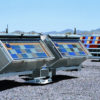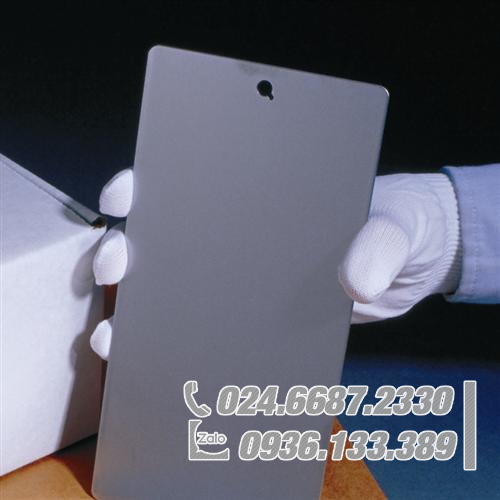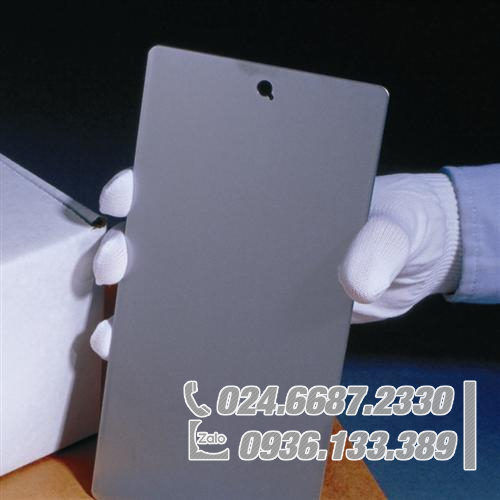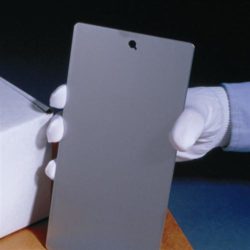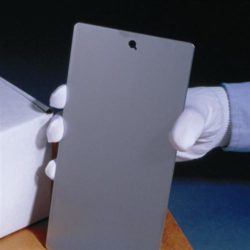For over 50 years, Q-PANEL steel and aluminum test substrates have been recognized as the world standard for a consistent and uniform test surface for paints, plating, adhesives, sealants, rust inhibitors and other coatings.
Thousands of labs around the world use millions of our steel and aluminum test panels every year for color development, weathering exposures, salt spray and corrosion testing, physical properties testing and quality control. A wide range of panel sizes and types are available for immediate shipment from stock.
Look for the Q-shaped hole. It’s our trademark and your assurance of quality.
If coatings tests are to be reliable and reproducible, they must be performed on a substrate which is reasonably consistent from test to test. Unfortunately, ordinary commercial sheet steel displays wide variations in the surface properties which affect the bonding of coatings.
Sources of Variability
Surface problems can come from a number of sources:
- Surface texture varies with the condition of the rollers used by the steel mill to cold roll the steel to its final thickness.
- Surface cleanliness varies with the mill’s cleaning procedure, especially the procedures used to control carbon smut. All too often, carbon smut is actually baked onto the steel during the high temperature annealing process which follows rolling. This carbon smut is impossible to remove except by mechanical abrasion.
- Rust varies with the care taken in handling (a) at the steel mill, (b) during transport and storage, and (c) during fabrication.
- Steel stored for a long time with rust inhibiting oil will react to form an incomplete oxide known as oil stain.
The result is that ordinary steel is unsuitable for many coatings tests. Although some commercial steel provides an excellent surface for coatings, you are just as likely to find steel which gives poor adhesion and poor rust resistance even with good coatings. In fact a single mill will often produce both very good and very poor surface quality, depending upon a number of uncontrolled factors. Cleaning and phosphating help, but they cannot overcome surface defects formed at the mill.
Q-PANEL steel and aluminum test substrates from Q-Lab minimize metal variability as a source of bias in critical paint, coating and adhesion tests. They are clean, consistent, convenient, and economical.
Clean
The Q-PANEL production process thoroughly cleans panels and removes any oil from the surface. Special handling assures that all panels are completely clean when they are packaged. Steel panels are packed in plastic bags in quantities of 20 to 50 panels (depending on type and thickness), with a vapor phase rust inhibitor inside a sturdy cardboard carton, for a shelf life of several years. Aluminum panels are packed similarly, except without the rust inhibitor.
Consistent
Three factors assure Q-PANEL substrates are consistent, high quality and low cost:
- volume metal purchasing from selected mills
- automated production on a high-speed line
- rigorous inspection at several processing stages
Convenient
Panels are supplied pre-cleaned, with a 6mm (¼”) Q-shaped hole (it’s our trademark and your assurance of quality). For safety and ease of handling, the panels have rounded corners and deburred edges. Our inventory of over a million paint test panels means that 95% of our orders are shipped from stock. In most cases panels can be used right out of the box.
Economical
Because of high volume production, Q-PANEL substrates cost less than you might expect for a standardized surface. Purchasing clean, safe, standardized panels reduces the time lab personnel must spend cleaning and handling panels.
Use our Q-PANEL Selector guide to browse our extensive list of standard panels and request information on a custom panel or get a quote.

